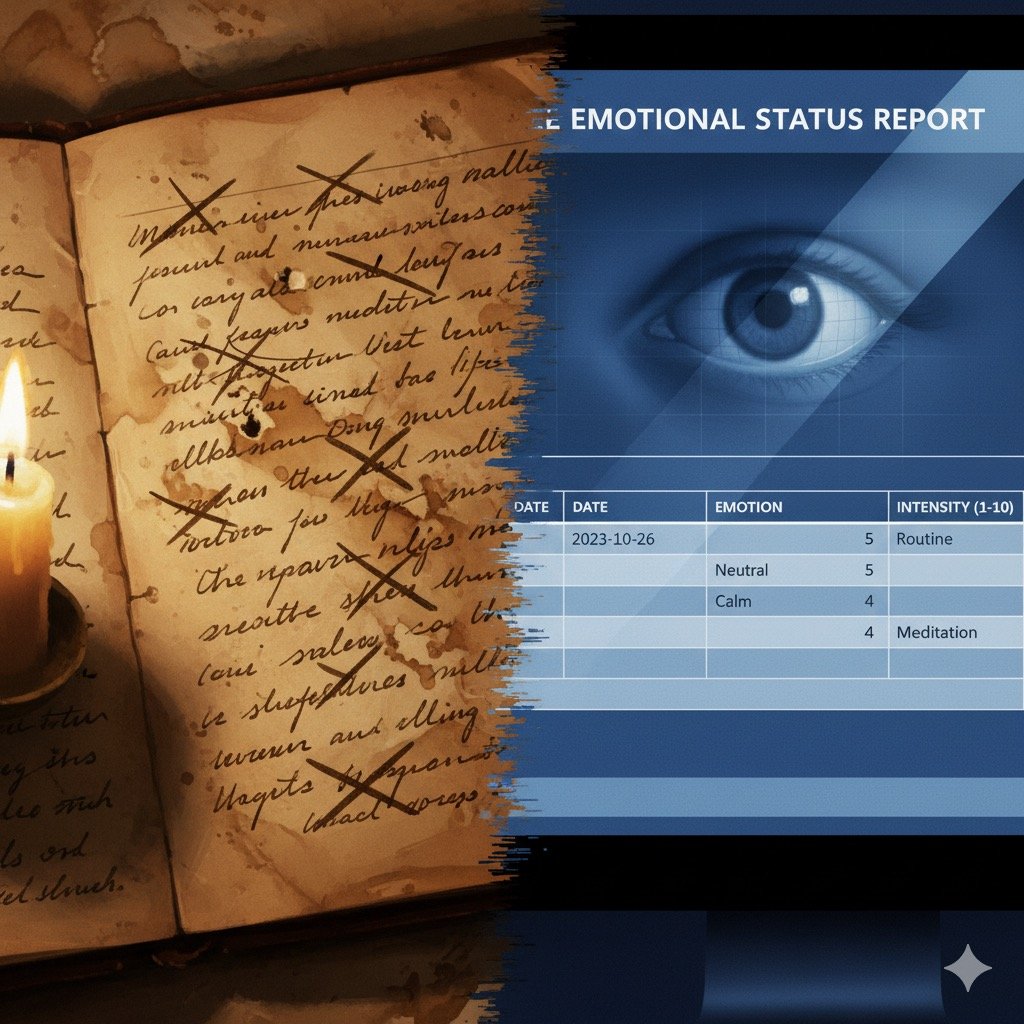Essays and Conversations on Community & Belonging
More Than a Report: Journaling, Reflection vs. Performance, and the 'leatherboy Handbook'
This essay begins with a personal reflection on the terror and necessity of private journaling and how the mere thought of being read turns reflection into performance. This personal tension is then used to critique the "leatherboy handbook" that proposes journals as a tool for intimacy in power-defined relationships. It argues that we must not trade the "costly signal" of messy, analog humanity with the "cheap signal" of a curated, digital report.
CULTURAL & ARTISTIC ANALYSISSHADOW AND PERSONATHE ARCHITECTURE OF THE SELFSUBCULTURE & COMMUNITYPERFORMANCE V AUTHENTICITYHIGH-BANDWIDTH SIGNAL
Alex Pilkington
10/25/20254 min read
My journals are not a blog or a feed. They are an antidote to the infinite, soul-deadening scroll, a frantic, private attempt to collect my own data before the algorithm does. They hold my messiest thoughts, the ones I write down with an absolute expectation of privacy. And in that privacy lies the terror of all real intimacy: that someone you hope for might one day read them and fully, resolutely reject the uncurated soul they contain.
Recently, I found myself willing to let him hold them—someone who has become a dominant topic of my recent attention. And that willingness revealed everything. The moment I considered that he might actually read them, the reflection ceased. A new journal was started. The performance began.
Within my private journals, I don't normally hide in ambiguous phrases; I'm not trying to impress the paper. But I was, very intently, trying to impress him.
This chasm between the raw reflection of the "Shadow" and the curated performance of the "Persona" is precisely the human problem that Chapter Eighteen of the Leatherboy Handbook attempts to solve. Or, rather, to manage.
Like so many well-intentioned guides, it tries to solve a human problem with a technical fix. The author, Vince Andrews, has sound motives. He identifies emotional chaos in a power-defined relationship as a problem and, with commendable prudence, proposes a journaling protocol to address it.
The solution, however, raises questions. Does it solve a problem of human connection by introducing a mechanism of surveillance? Does it seek intimacy through a tool of inspection? The result is a foundational tension between two contradictory goals.
At the heart of any relationship, and especially one of defined power, is a profound information asymmetry. The submissive possesses a universe of internal data—their true feelings, their fleeting angers, their "Shadow"—that the Dominant cannot, by definition, access.
The journal is proposed as the solution, the bridge across this chasm. It is the tool the Dominant "uses to tell what their submissive is feeling." Yet, one must wonder: Does this solution, by its very design, risk paving over the chasm rather than bridging it?
Here, the entire therapeutic project collapses into a managerial one. The chapter guides the submissive to be "constructive" and "write with tact," all while maintaining "absolute honesty." One must ask: which is it?
Is the submissive, in fact, being instructed to subordinate the complex, messy, contradictory self to the category of "good submissive"? If so, is the Dominant receiving the unfiltered "Shadow," or merely a curated report from the "Persona"—a performance of acceptable vulnerability?
To be clear: reporting protocols are not, in themselves, terrible. Data has its uses. One can update a spreadsheet or run through a 'feelings wheel' and call it a day. But the handbook's specific choice of the journal is what's so revealing. Journaling is, at its core, a human endeavor. Which is precisely what makes its formalization into a "report" so fraught—it risks turning an act of reflection into an act of compliance.
The handbook's breezy dismissal of the medium itself... "now do not have to be handwritten" and can exist on "cloud drives, specialized application software, blogs, and even simple emails"... is where the modern error is most plain. This isn't a trivial detail; it is the entire question.
A "simple email," as the handbook suggests, is the cheapest signal imaginable. It costs nothing. The backspace key is its god. It is a medium perfectly designed for managing information, not for revealing a self.
And so we are forced back to the analog. We must consider the costly signal of handwriting. Its value is its cost. It costs time. It costs effort. You cannot delete a tear-stain. You cannot digitally erase an angry, slashed word without leaving evidence. These elements compose the analog data stream of the soul. They are the "Shadow" made verifiable, precisely because they are costly to produce and difficult to fake.
Does accepting a digital journal, then, mean accepting a cheaper, less trustworthy signal? Is it a flight from conversation into a disembodied realm that filters out the very humanity one claims to seek?
A true bond, one suspects, can not be built on prudence alone.
When the handbook encourages a submissive under duress to "act first and journal frustrations later," it explicitly substitutes a cheap, asynchronous "report" for the costly, "analog" confrontation. This workflow prioritizes data entry over direct human engagement. It is a flight from the real.
A relationship this intense, one must assume, requires a sacred compact built on actual trust. Not a system, but a compact. The submissive must trust that their Dominant is capable of receiving the unfiltered "Shadow" without flinching; that they can offer mature acknowledgment, not just simplistic admiration or reflexive punishment. They must trust that the person in power can handle the full, complex truth of another human being.
And in turn, the Dominant must have the practical courage to "touch grass"—to reject the cold, disembodied safety of the cheap signal. They must be willing to demand the costly, analog, human data that can only be found in a direct, face-to-face encounter.
This, ultimately, is the central question. Is this tool, in the end, an instrument of trust, or a monument to its absence?





